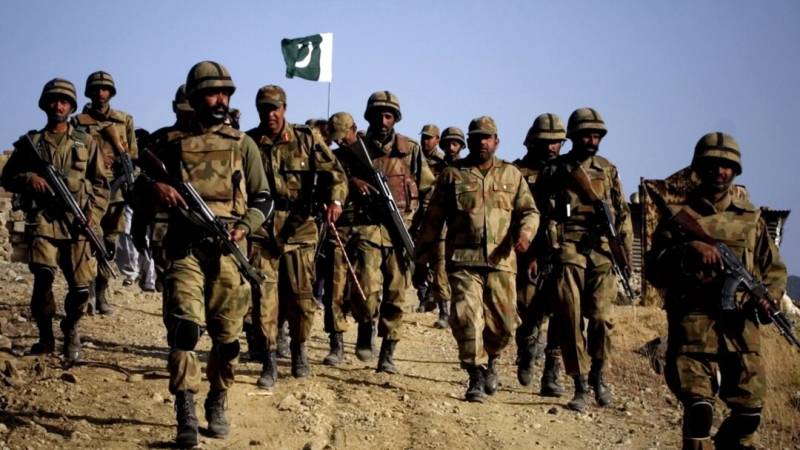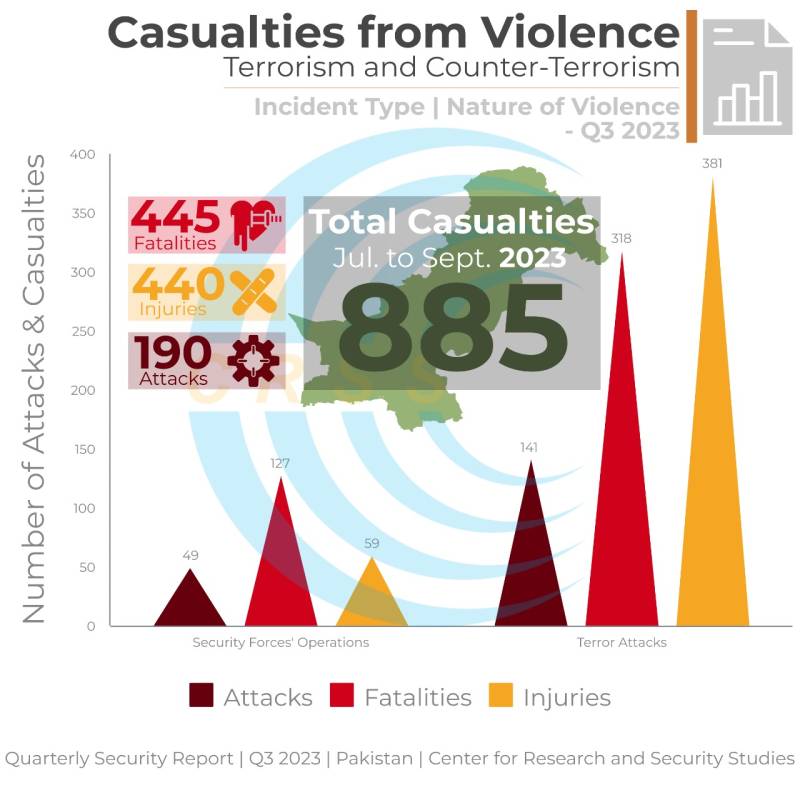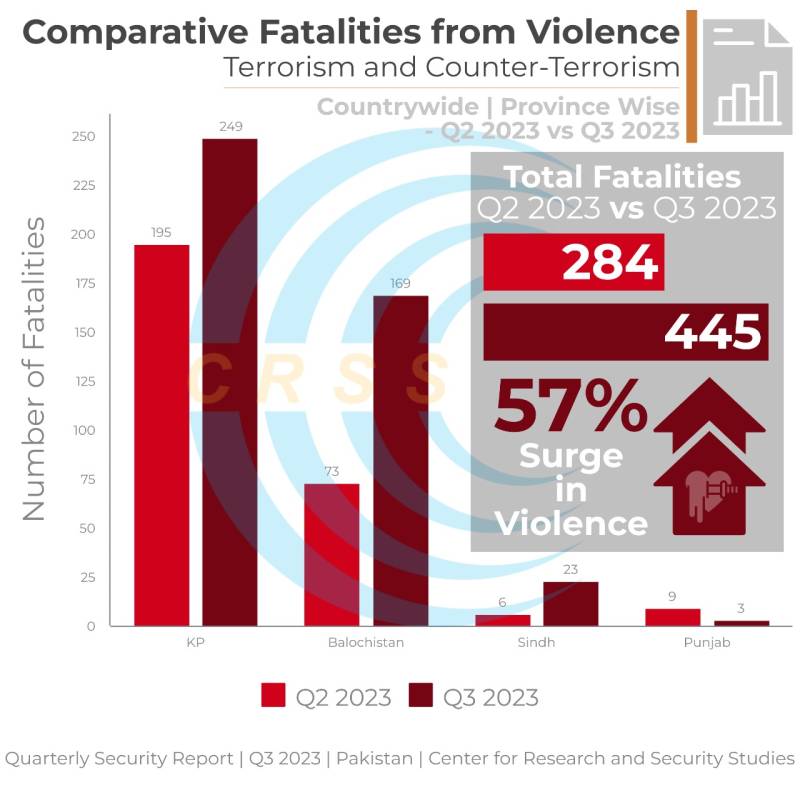
There seems to be no end in sight to the cycle of terrorism, as the third quarter of this year has witnessed a 57% surge in fatalities from the fresh wave of violence. Over the past three months, Pakistan has lost 445 lives due to this unrelenting violence, with an additional 440 individuals who were wounded. This upswing in militancy coincided with the resurgence of the Taliban in Kabul, who claim to be a Sharia-compliant government.
The two provinces of KP and Balochistan, close to the Taliban-governed Afghanistan, have been the epicenter of terrorism for the last three years, sharing the largest burnt of violence in the country which has continued going up from 72% of total fatalities in 2019 to 95% at the end of September 2023.
The alarming surge in militancy in two specific regions can be attributed to several key factors. Firstly, it is driven by the resurgence of the Tehreek-e-Taliban Pakistan (TTP), an organization officially banned in Pakistan, but operating with legal cover in Afghanistan and clandestine support from the ruling Afghan Taliban. Furthermore, reports suggest a strategic collaboration or alliance has formed between the Baloch insurgents and TTP, facilitating their coordinated terror activities.
Illustratively, on July 12, 2023, two districts in Balochistan, Dera Bugti and Zhob, witnessed violent attacks. These incidents resulted in the tragic loss of three soldiers in the Sui area of Dera Bugti and nine soldiers in the Zhob cantonment area. The Baloch Liberation Tigers (BLT) claimed responsibility for the Sui attack, while the Tehreek Jihad Pakistan (TJP), a newly emerged militant group believed to be associated with TTP, took credit for the assault on the Zhob garrison. The synchronicity of these attacks on the same day strongly implies a connection between the Baloch insurgents and TTP.

The incidence of suicide attacks has witnessed an exponential increase this year, reflecting a trend that gained momentum soon after the Taliban's control in Afghanistan. To put this into perspective, in 2020, the nation recorded a mere three suicide attacks. However, this number surged to six in 2021, escalated to 20 in 2022, and by the end of September 2023, it had soared to a total of 26.
A significant shift in Baloch insurgent’s tactics emerged the previous year when a female suicide bomber, associated with the Baloch Liberation Army (BLA), targeted Chinese educators at Karachi University on April 22, 2022. This marked the first instance of Baloch insurgents resorting to suicide bombing. The emulation of the suicide bombing strategy in subsequent attacks this year underscores their commitment to adopting this as a permanent modus operandi, mirroring the trend long followed by the militant organizations.
The incidence of suicide attacks has witnessed an exponential increase this year, reflecting a trend that gained momentum soon after the Taliban's control in Afghanistan. To put this into perspective, in 2020, the nation recorded a mere three suicide attacks. However, this number surged to six in 2021, escalated to 20 in 2022, and by the end of September 2023, it had soared to a total of 26. Seven of these 26 attacks were claimed by the TTP, with TJP, Daish (IS), and BLA each taking responsibility for one, while 15 remain unattributed to any specific militant group.
The broader context reveals that a total of 405 terror attacks, including suicide attacks, armed assaults, and explosive incidents, were documented during nine months of this year. Of these attacks, 77 were claimed by different banned organizations, with the TTP standing out as the most prolific claimant, laying claim to 42 attacks, followed by BLA with claims for 18 attacks, while the Sindh Revolutionary Army (SLA) and Daish (IS) each claimed three. The Baloch Liberation Front (BLF) and the Baloch Liberation Tigers (BLT) each also claimed one attack.
These claims draw a worrisome picture, indicating that insurgent and militant groups have intensified their terror operations significantly. Their concerted efforts appear geared toward reversing the progress made since the Zarb-e-Azb operation, threatening to destabilize the nation's security once again and prove the assertions made by the Afghan Taliban that Pakistan should address its internal problems rather than laying blame on external factors for its shortcomings.
Over the past nine months of this year, a troubling pattern has emerged wherein the frequency of terror attacks and the ensuing casualties have consistently surpassed the efficacy of security operations. This disconcerting trend is vividly illustrated by the escalation in fatalities caused by terror attacks, which rose from 64% in the first quarter to a concerning 71% in the third quarter.
This data highlights a disconcerting reality where security efforts are falling significantly behind in their efforts to counteract the prevailing militancy in the country. Consequently, there has been a steady and troubling increase in the number of casualties suffered by both security personnel and civilians alike.
For the first time in the past two decades, a procession commemorating the Prophet Muhammed (PBUH) on Eid Miladun Nabi day fell victim to a heart-wrenching suicide attack in Mastung, resulting in the tragic loss of 60 innocent lives. In a nation where the reverence and sanctity of the Prophet Muhammed (PBUH) are held as the highest and indisputable values, this act of terrorism is not only inconceivable but also profoundly shocking.
It is disheartening to note that sectarian violence has already claimed 168 lives this year, with the victims comprising 149 Sunnis, 7 Shia, 4 Hazara Shia, 3 Christians, 2 Hindus, and 3 Sikhs.
This nefarious incident marks a distressing development, as the menace of sectarianism, which has historically targeted minority communities of non-Muslims and the Shia sect, has now escalated to a new level by directly targeting the sanctity of the central pillar of the Muslim faith.

On that same fateful day, another suicide attack unfolded at a mosque in Hangu, just as Sunni Muslims were preparing for the Jumma prayer. This tragic event claimed the lives of four individuals and left several others trapped beneath the wreckage of the mosque's collapsed roof.
It is disheartening to note that sectarian violence has already claimed 168 lives this year, with the victims comprising 149 Sunnis, 7 Shia, 4 Hazara Shia, 3 Christians, 2 Hindus, and 3 Sikhs.
Visiting the injured victims of the suicide attack on Eid Miladun Nabi procession, the Chief of Army Staff, General Syed Asim Munir made a remark against the perpetrators of this attack in these words: “Such incidents of Terrorism on 12 Rabiul Awwal depict the ill intent of the Khawarij, who have the backing of State Sponsors of Terrorism. These terrorists and their facilitators, having no link with religion and ideology, are proxies of the enemies of Pakistan and its people."
Regrettably, the militants are not the only ones to show such disrespect to religious places. Even religious individuals and law enforcement agencies have been involved in similar transgressions against the places of worship belonging to non-Muslim communities. Disturbingly, there have been 54 documented incidents of sectarian violence targeting the places of worship of non-Muslim communities this year, encompassing 22 churches, 17 Ahmadi places of worship, 13 Ahmadi graves, one Sikh Gurdwara, and one Hindu temple.
One poignant example is found in FIR #1259 and 1260, filed in Jaranwala, which recounts a harrowing incident. A mob of 500 to 600 individuals, led by figures like Mufti Mohammad Younus of Ahl-e-Sunnat and Asifullah Shah Bukhari of TLP, descended upon a mosque armed with sticks, petrol bottles, and other weapons. The leadership within this group incited them to launch an attack on the nearby Church and the residences of Christians in the vicinity.
The security situation in the country now constitutes threats not only from militants and insurgents, but also from extremist elements within religious parties and groups. These instances represent alarming displays of religious intolerance and violence that require urgent attention and concerted action against all those events that manifest extremism and intolerance in any shape and form.

